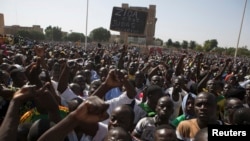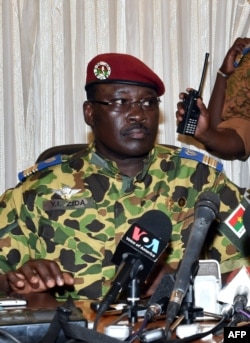Thousands of Burkinabe took to the streets again Sunday, in Ouagadougou, this time to protest the army, which the political opposition says is trying to hijack the people’s ousting of President Blaise Compaore. The military declared itself in charge Friday after four consecutive days of large and at times violent protests resulted in Compaore's resignation.
Some carried signs reading “Soldiers stole our revolution.”
One protester told VOA this wasn’t a coup so citizens don’t understand why the military thought they could choose the new head of state.
The opposition had called for the protest.
“The victory resulting from this people’s insurrection belongs to the people and as a result the leadership of the transition belongs to the people and should not be confiscated under any circumstances by the army,” Opposition member Jean Hubert Bazié said as he read the declaration late Saturday, adding that the the transition should be “democratic and civilian.”
Closed door meeting
Opposition leaders spent Sunday behind closed doors meeting with the country’s military leader, Lt. Col Yacouba Isaac Zida.
Outside, demonstrations gave way to more of the confusion that has characterized the crisis.
Soldiers took over the state television station and fired warning shots to disperse a large crowd Sunday afternoon.
Opposition politician Saran Sereme was inside. People in the crowd said she was going to declare herself president. But Sereme told reporters afterwards the crowd had pushed her there and she sought refuge inside. Sereme said she was not going to make a statement.
Zida in charge
After Compaore's resignation Friday, two military officers each made statements claiming to be in charge. On Saturday, the military named one of them, Lt. Col. Zida, as head of the transition.
Zida, the number two in the country’s elite presidential guard, has pledged to hold democratic elections “as soon as possible,” but has given no details.
He suspended the constitution, declared a nighttime curfew and shut the country’s borders.
The United Nations, African Union and the Economic Community of West African States have sent delegations to Burkina Faso.
U.N. special representative Mohamed Ibn Chambas called for dialogue and said Sunday “we hope for a transition led by a civilian and in line with the constitution." “If that is not done,” he said, “the consequences are clear.” He said they must “do all they can” to avoid sanctions and a suspension of Burkina Faso.
Analysis
In Washington, Dr. Sulayman Nyang, professor and chairman of the African Studies Department at Howard University, says events in Burkina Faso must be looked at in relation to developments in other parts of Africa.
“We have to go back over two years when the situation was unfolding in North Africa. What was called the Arab Spring must be translated as the political Harmattan wind from the North to the South. It took this long before the Harmattan hit West Africa,” Nyang said, adding that the Burkinabe youth are not taking action simply because they didn’t like President Compaore.
“They are fighting because they don’t want dictators that stay there and they create corruption, lack of transparency and bad governance,” Nyang explained. “They are not fighting for personality or military leaders, they are fighting for justice.”
Nyang says President Compaore was able to stay in power for 27 years for many reasons.
“Compaore was very close to Houphouet Boigny [in Ivory Coast], Charles Taylor [in Liberia], Fode Sanko [in Sierra Leone] and his ability to serve as a broker and a peacemaker between the contending forces legitimized his role.”
Constitution
The Constitution says the head of the National Assembly takes over in the president's absence. However, he has reportedly also fled the country and the army dissolved the National Assembly. In such a case, the Constitutional Court could name a new leader.
The international delegation said the regional Ebola epidemic makes it especially important for the country’s interim leadership to restore government administration and public services as soon as possible.
Burkina Faso has not had any confirmed cases of Ebola, but neighboring Mali declared its first case in October.
Mariama Diallo contributed to this report from Washington





